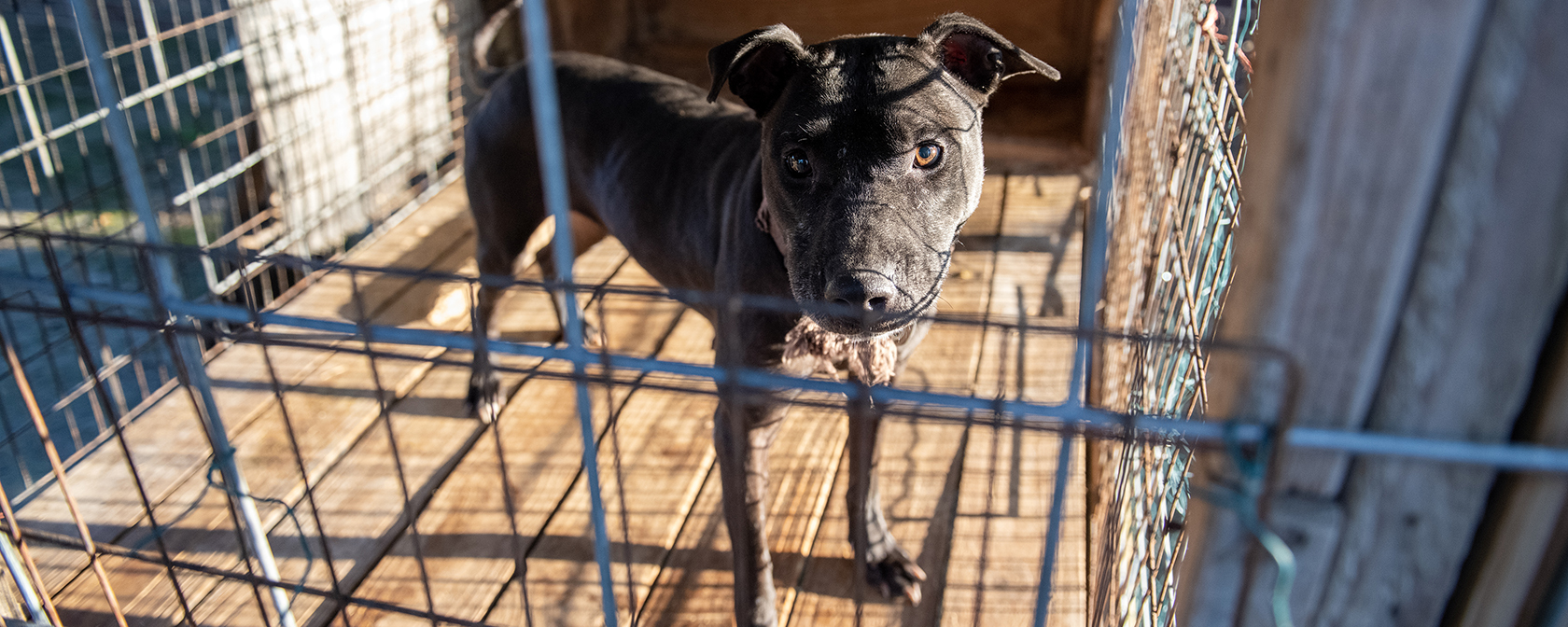By Sara Amundson and Kitty Block
Last week, a Pentagon official was arrested and charged with animal fighting in the wake of a federal investigation that revealed his 20-year career in dogfighting. This arrest highlights what we have seen time and again, that dogfighting involves people from all stations of life, here in the U.S. and in many different countries across the globe. When it comes to the perpetrators of this appalling crime, nothing surprises our investigators at this point. The people we’ve seen arrested and convicted for dogfighting over the years have included animal control officers, firefighters, policemen, church officials, veterinarians, schoolteachers, government employees, musicians, professional sports players and family members of some well-known celebrities.
We have been working to put an end to dogfighting for many years through public education and support for state and federal legislation that takes dogfighting seriously, and by assisting law enforcement in building cases against dogfighters and training law enforcement officials on how to conduct dogfighting investigations. We’ve driven the passage of key upgrades to the nation’s animal fighting laws, and our trainers are highly sought after instructors in communities all over America.
Because this cruelty is on the rise in other countries, we have greatly expanded our work outside of the U.S., too. Unfortunately, dogfighting is proliferating throughout Mexico and South America, as well as in Eastern and Western Europe, the Balkans, Russia, South Africa, Australia, China, the Philippines, Indonesia and many other countries. Like many of the other cruelties we fight, we’ve had to chase dogfighting literally across the globe. It is not enough to fight the fight in the U.S. as we must ensure that the export of this horrific activity does not allow it to thrive elsewhere.
American dogfighters have worked hard to try to ensure the survival of their operations (and their profits), by exporting dogs and outsourcing their fights outside the U.S. as enforcement has increased within our borders. A few prominent dogfighters have even made it their mission to travel to countries to encourage and spread dogfighting. These individuals are sometimes seen as celebrities within the dogfighting world, with kennels and yards they’ve visited putting the photos of their visits on display and posting accolades they have received from them.
Some find it hard to understand how individuals in prominent positions could be involved in such criminal activity, which frequently puts them in direct contact and alliance with elements of organized crime in situations that can even pose a danger to their lives. But, like most types of organized crime, dogfighting is ultimately a business, and it can be big business at that. Tens of thousands of dollars—even hundreds of thousands of dollars—can change hands at dogfights. In addition, the sale of puppies, breeding rights and dogs from prominent kennels can produce major profits for the individuals involved. While there may be other reasons that people chose to engage in this illegal and dangerous activity—such as the fame they can gain within the dogfighting world, the relationships they build with other dogfighters, the pride they feel in their winning dogs and maybe even a distorted sense of love for the dogs—it is unlikely that most of these people would risk so much without the promise of potential riches.
Once legal and widely popular throughout the U.S., dogfighting is now a felony in all 50 states and illegal in U.S. territories, as well. However, the many years of legal dogfighting cemented the appeal of many famous dog breed bloodlines and created a demand for them around the globe. In countries such as South Korea, for examples, the bloodlines of dogs forced into fighting can be traced back to their original U.S. source. Of course, there are thriving breeding operations in other countries now, and some of them have their own famous bloodlines, but the responsibility for the persistence of dogfighting worldwide still lies largely with the U.S.
We have come to understand that dogfighting is an interconnected world where dogs are traded across state and country lines, and fights are arranged (and the outcomes of these fights are known) by dogfighters around the globe. To fight against this world of dogfighting requires strong cooperation of law enforcement agencies at all levels and also between states and countries. We strive to forge and strengthen these connections because ultimately dogfighting, like other forms of organized crime, won’t end until the risk of arrest and exposure outweighs the promise of profit. Until that time, we will continue to find dogfighters in many places, whether it’s the classroom, the fire and rescue station, the locker room, the pulpit or the Pentagon.
Kitty Block is CEO of the Humane Society of the United States.
